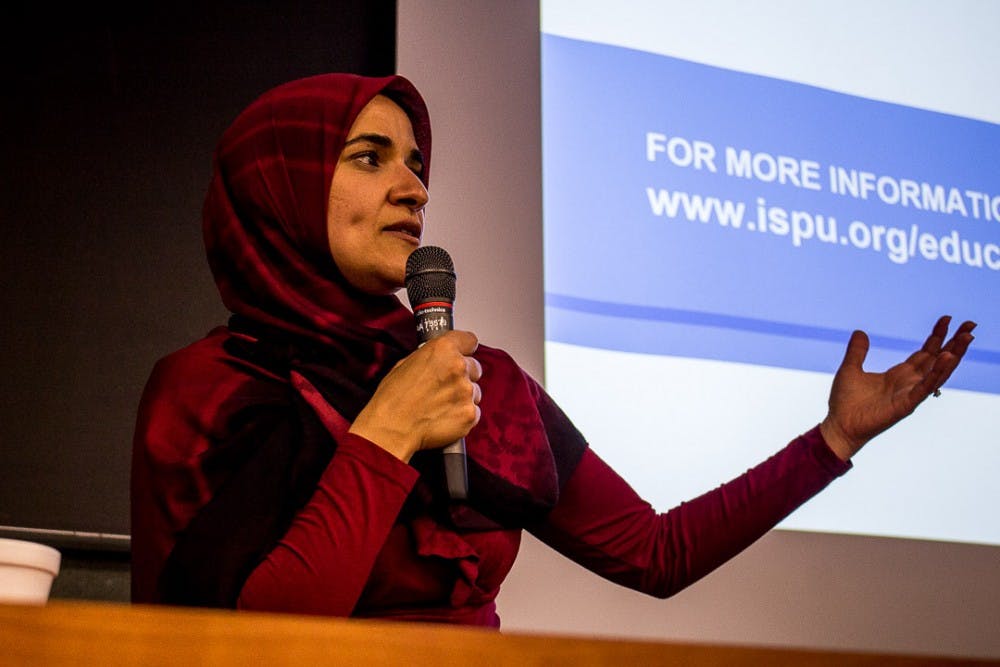On Monday night, the Muslim Studies Program held a 'Muslims and U.S. Politics' event at the MSU International Center, where Dalia Mogahed, director of research at the Institute for Social Policy and Understanding in Washington, D.C., was a guest lecturer.
At the lecture, Mogahed spoke about the findings of the Institute for Social Policy and Understanding's 2018 American Muslim Poll.
The survey was conducted with a nationally represented sample of Muslims, Jews, Protestants, White Evangelicals, Catholics, nonaffiliated Americans, as well as the general public.
The total sample size was just shy of 2,500.
“The first thing that we discovered is that the majority of Americans actually support Muslim civil rights. However, islamophobia does exist, and it’s linked to things that most of us probably don’t want,” Mogahed said. “Like the approval of authoritarianism, condoning violence and anti-Muslim discrimination.”
Mogahed said the survey showed that, more often than not, American Muslims are more likely to condemn acts of violence than someone of any other faith.
Mogahed cited a survey that was conducted elsewhere that concluded that the majority of American fatalities at the hands of extremists are the result of right-wing terrorists, not from extremists acting in the name of Islam.
“Someone perceived to be Muslim who is accused of a terrorism plot, who didn’t carry it out, they were just accused, will receive 770 percent more media coverage than someone accused of a very similar plot that was going to be carried out in the name of a different ideology,” she said.
In the survey, all participants were asked how often they wear a visible symbol that makes their faith identity easily known.
In the 46 percent of Muslim women who said they wore a hijab all the time, the majority said that the reason they wore it is because they view it as a religious obligation and not because someone was forcing them to.
The results of the survey, according to Mogahed, also show that Muslim women are far more likely to receive religious discrimination than not only Muslim men, but women of any other religion as well.
“Despite all of these social costs to being Muslim or visibly Muslim, Muslims are among the most likely to say their faith is a source of happiness,” Mogahed said.
Mogahed mentioned in her speech that most Muslims are proud of their faith, and that a stronger religious identity correlates with a stronger American identity.
Mogahed said islamophobia is only hurting the American way of life.
At the age of 15, Mogahed stumbled upon the autobiography of Malcolm X at her school library in Madison, Wisconsin. She credits the discovery of this book for changing her life.
“By reading this book, by discovering the life story and the transformation of Malcolm X, I discovered that my identities, I was a Muslim, I was of Egyptian origin, I was an America, that these things were not opposites, these things were not competing identities. They were one in the same, they were a part of each other. Malcolm X personifies this concept, this idea, that my faith and my passion for social justice were in perfect harmony,” Mogahed said.
With the foundation set, Mogahed said she was primed for a lifetime of activism. In 2009, President Barack Obama appointed her to the President’s Advisory Council on Faith-Based and Neighborhood Partnerships.
With this appointment, she was invited to testify in front of the U.S. Senate Committee on Foreign Relations about the nation's engagement with Muslim communities.
In 2016, Mogahed gave a TED talk about what it’s like to be a Muslim in America. This was considered to be one of the best TED talks of the year.
As the director of research at the Institute for Social Policy and Understanding, Mogahed spearheaded a national survey of major religions in America to understand what ordinary people think about those who practice Islam.
Support student media!
Please consider donating to The State News and help fund the future of journalism.
Discussion
Share and discuss “Dalia Mogahed speaks to MSU students at 'Muslims and U.S. Politics' lecture” on social media.







